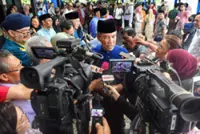KOTA KINABALU: A comprehensive, Sabah-centric approach is needed to tackle long-standing citizenship issues in the state without marginalising its people, says the legal fraternity.
Sabah Law Society (SLS) president Mohamed Nazim Maduarin said in acknowledging the Federal Government's intent to address the state's perennial statelessness crisis, it believed any amendments to citizenship laws must consider the unique context and realities here.
Putrajaya's commitment to this issue was highlighted in recent statements by Home Minister Datuk Seri Saifuddin Nasution Ismail about seeking a “once-and-for-all” solution.
ALSO READ: ’New citizenship law a win for mums but not for the stateless’
Mohamed said statelessness remains a complex challenge for Sabah as its population, estimated to be between 300,000 and 500,000, includes children born to mixed-nationality parents, indigenous rural communities, and individuals affected by socio-economic challenges.
“Addressing their statelessness is a moral and legal obligation, but we caution against conflating this population with undocumented migrants or other foreign nationals,” he said in a statement on Friday (Oct 18).
“Such confusion risks marginalising Sabahans further and complicating the resolution process, Sabah’s special circumstances must be considered."
In light of these complexities, SLS called for a careful Sabah-centric approach to citizenship in the state.
“We note the concerns of various quarters, including civil society, about the potential negative impact of removing automatic citizenship for children of permanent residents.
“Such amendments could disproportionately affect Sabahans, especially those in rural or marginalised communities,” he said.
Mohamed said Sabah’s unique socio-political landscape, including its proximity to international borders and historical experiences with undocumented populations, warrants an exemption from these provisions.
“As highlighted by key stakeholders in Sabah, there is widespread concern that a blanket application of these amendments could have unintended negative consequences,” he said.
He suggested a collaborative path forward following the Dewan Rakyat's passing of citizenship law Constitutional amendments on Thursday (Oct 17), and urged Putrajaya to hold further consultations with Sabah’s stakeholders on the specific needs of its stateless persons.
“We remain committed to ensuring that Sabah’s unique context is considered in the ongoing implementation of these changes, and we will continue advocating for solutions that protect the rights and future of all Sabahans,” he said.
ALSO READ: ‘Cut out red tape to ensure citizenship law reforms meet deadline’
On Thursday, Saifuddin called for a definitive, "once-and-for-all" solution to Sabah's long-standing citizenship issues when winding up debates on the Constitution (Amendment) Bill 2024 in the Dewan Rakyat.
He said he would tackle the Sabah citizenship issue next and had asked for the cooperation of the state government.
He said that in line with Article 161E of the Federal Constitution, the amendments had already been approved by the governors of Sabah and Sarawak and the Conference of Rulers.
Saifuddin added that amendments regarding the children of permanent residents not receiving citizenship by law would not affect Orang Asli, Sabah natives and Sarawak’s indigenous people.
He explained that the three groups are Malaysian citizens by operation of law under Articles 160(2), 161A(6)(a) and 161A(6)(b) of the Federal Constitution.











































